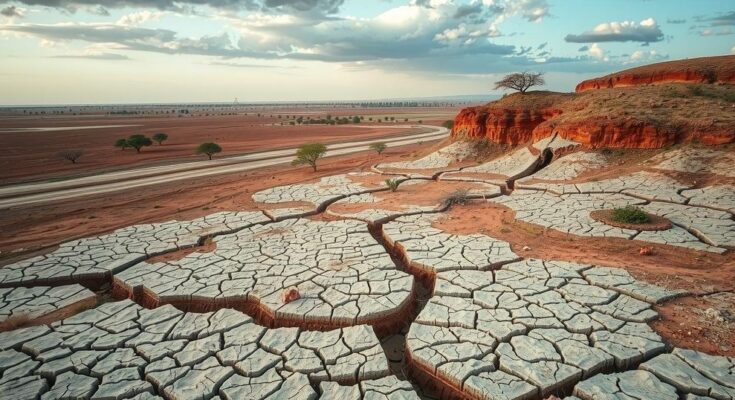Kenya is experiencing its worst drought in the past 40 years, causing severe water and food shortages. Millions are affected as water sources dwindle, prompting dangerous journeys for clean water. The recent COP29 highlighted Kenya’s dire need for support, leading to the Baku Climate Unity Pact aimed at assisting vulnerable nations. The challenge remains in implementing effective solutions to combat these climatic changes.
Kenya is currently grappling with its worst drought in four decades, severely impacting millions of citizens who are struggling to secure adequate water and food supplies. Previously, Kenya’s climate followed predictable seasonal patterns, but recent years have seen a rise in the frequency and severity of drought incidents. This change threatens the livelihoods of residents in arid and semi-arid regions, where agriculture and livestock are crucial for survival. The United Nations reports that this crisis has left countless Kenyans without reliable access to clean water, as rivers, lakes, and aquifers continue to dry up. In northern Kenya, women and children face arduous daily journeys to retrieve unsafe water, exposing them to health risks such as infections.
During the 2024 UN Climate Change Conference (COP29) held in Baku, Azerbaijan, Kenya emphasized the urgent need for increased financial support from developed nations to address these challenges. A significant outcome of the conference was the “Baku Climate Unity Pact,” which outlines collective financial goals aimed at assisting vulnerable countries. This pact aims to bolster the resilience of nations severely affected by climate change, particularly those with minimal greenhouse gas emissions yet heavily reliant on climate-sensitive resources. Despite a robust international commitment to support these nations, the foremost challenge resides in actualizing these pledges into effective actions that can mitigate the dire impacts of drought and climate change that countries like Kenya continue to face.
Drought has become an escalating issue in Kenya, exacerbated by a series of climate emergencies that disrupt the traditional seasonal cycles once predictable to the populace. The repercussions are devastating, with agricultural practices and livestock rearing—foundational elements of livelihoods in arid regions—now under severe threat. Millions suffer from water scarcity as essential water bodies and aquifers decline. This systemic crisis highlights the interplay of climate change and socio-economic vulnerability, necessitating immediate and sustained intervention.
In summary, Kenya is enduring an unprecedented drought, impacting millions and highlighted by a critical shortage of water and food. The international community, as evidenced by outcomes from COP29, recognizes this plight and has pledged support through the establishment of financial structures like the Baku Climate Unity Pact. However, the true test lies in transforming these promises into actionable solutions that effectively address the ongoing challenges posed by drought and climate change.
Original Source: www.aljazeera.com




